The breakdown that followed Burhan’s killing pushed Kashmir back to protracted protests. Remote-controlling an unprecedented disobedience movement, the man known for his defiance had apparently an uneasy task at hand. Fifteen weeks after, with the man at fag-end of his political career, the “what next” question might be now worrying Hyderpora more, reports Bilal Handoo
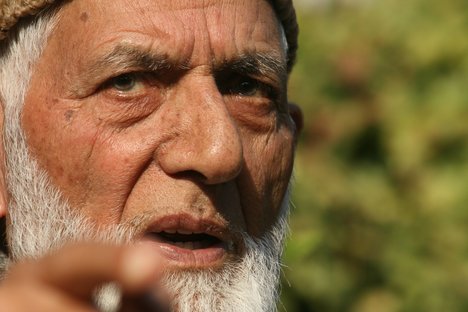
No visitor is welcome on this militarised street. Cops wearing stern faces send back everyone. Nobody is allowed to meet the man who shut his door on Delhi this past summer. It is Hyderpora—Kashmir’s ‘grand old’ address of an unwavering defiance—where the octogenarian “Qaid-e-Inquilaab” is remote-controlling Kashmir from his home, where he is perpetually detained.
For someone like Syed Ali Geelani—unapologetically pro-Pakistani—the detention is nothing new. When Omar Abdullah punished the man post-2010, he became prisoner in his own home. By 2015 ending, the man like a rusting police van stationed at his gate had taken much of the brunt. Both had become immovable. This season, the patriarch bounced back with his signature defiance. Cops white-varnished the old van and parked a new, modern one, too.
But as Home Minister Rajnath Singh confirmed the “larger than life” rebel’s killing, an imminent summer storm was on the horizon for the man meant to play no second fiddle. Witness to Kashmir’s chequered history, Geelani followed up Commander Burhan Wani’s killing and brought Kashmir to standstill.
The first protest calendar followed the heap of 30 corpses in three days. With tick of the clock, it was getting grotesque and gory. At first, gauging the incensed mood, Geelani — known for his personality cult, plaudits and diatribes — apparently patted the back of the young, telling them they are tehreek’s driving force.
Blood-hounding on streets was meanwhile making the summer intense. As an unnerved government sought Hyderpora’s intervention in restoring calm, Geelani sent a letter to United Nations listing six Confidence Building measures (CBMS)—including rapid “demilitarization” process of population centres and repeal of “draconian” laws like AFSPA and Public Safety Act—to restore normalcy. Amid peaking dissent, Geelani knew how state was getting unnerved — because he was once part of it.
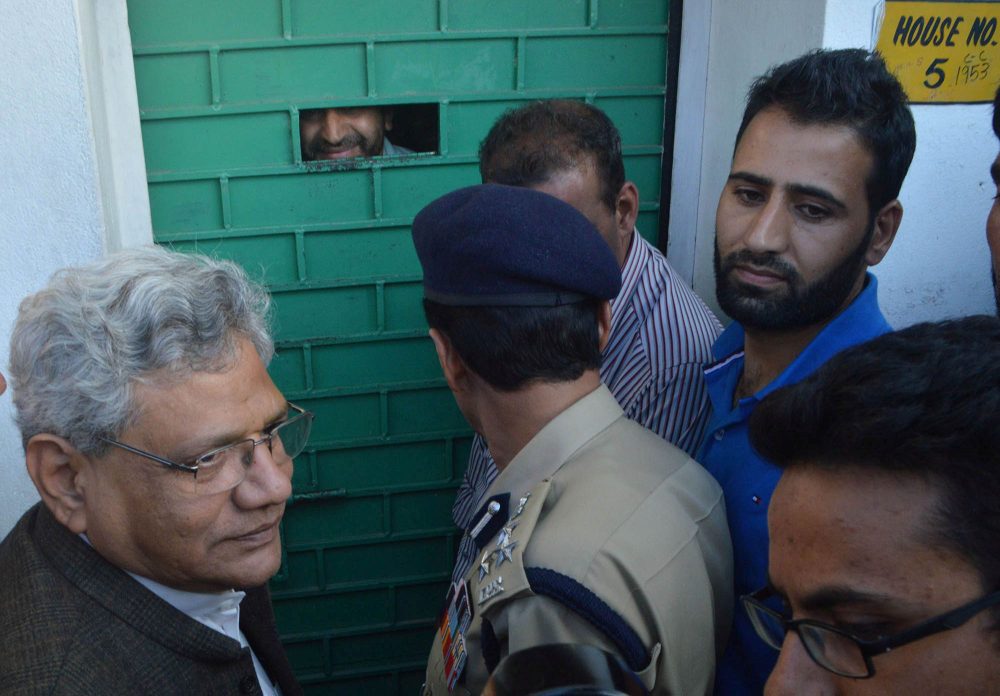
On August 19, 1989, Geelani had a busy day in office. The lawmaker was part of a crucial meeting called by chief minister Farooq Abdullah to understand changing Kashmir. ‘Trained boys’ were detonating bombs to chagrin of Abdullah and Delhi. The lawmakers were asked: what was happening? An independent member said it was anger at Abdullah’s rule. The BJP member said the rising militancy should be crushed with a heavy hand.
When Geelani spoke, he cautioned everyone that it was a political problem, left unaddressed by Delhi. “If it is not redressed in time,” Geelani warned, “the problem will increase.” He proved prophetic.
Geelani resigned in protest, boycotted elections forever. But he was hesitant to support militancy initially before a change in heart made him to support his men. Soon, he was leading funerals of Hizb guerrillas. But he shortly landed in jail and came out only in April 1993. By then, Kashmir had changed a lot.
His defiance continued, costing him dearly. He survived 12 assassination attempts and went underground. One attack came on October 1, 1996, when two rockets exploded almost inside his room. However, the man who takes Delhi head-on never changed.
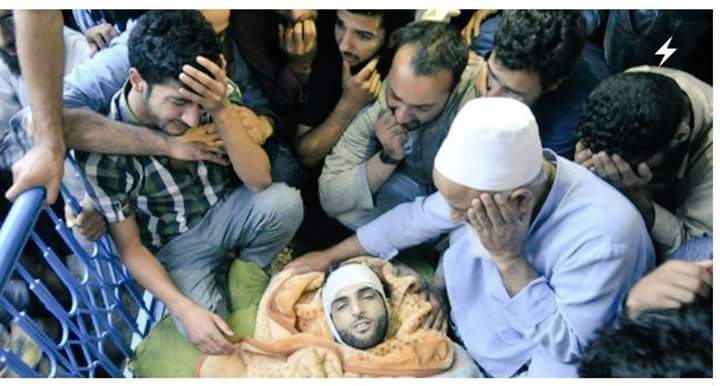
But after Burhan’s killing, even Geelani realised that it was never going to be pushover for him. The rebel’s killing had made every street mourner a custodian of tehreek. In their attempt to travel South, some scribes even tried bargaining with boys that they were Geelani’s supporters. It didn’t help despite Geelani making a thrilling disclosure: “Burhan spoke to me four days before his martyrdom.” Some were quick to term it a sign of anarchy in valley. “It is even beyond Geelani’s control now,” the Prime Time talkers argued. Even state’s policymakers still believe that.
It was the time when every bleeding protester would hospitalise himself as “Burhan Wani”—the name that triggered diplomatic tensions for Delhi on global front.
Amid all this, the ailing man would regularly come out of his Hyderpora residence, sit on street in protest only to be whisked away in a police van and released later. “It was a different Geelani who wanted to stay closer to street at a time when blood was being spilled on it unabashedly,” says one JKLF man. Already, the incarcerated Mirwaiz Umar Farooq and Yasin Malik had vested veto powers to him. It apparently made the ailing grandpa’s task heavier.
But the fortitude of the man known for signature remark—“They must demilitarise this whole region, revoke black laws, and release prisoners”—worked when after initial days of anarchy, order returned on streets. Geelani being the face of the joint Hurriyat was back to control the pulse of everything. Shops, trade and other things would open as per Geelani’s calendar. They shut when Geelani would tell them to shut. It was a new normal, enigmatic for his detractors.
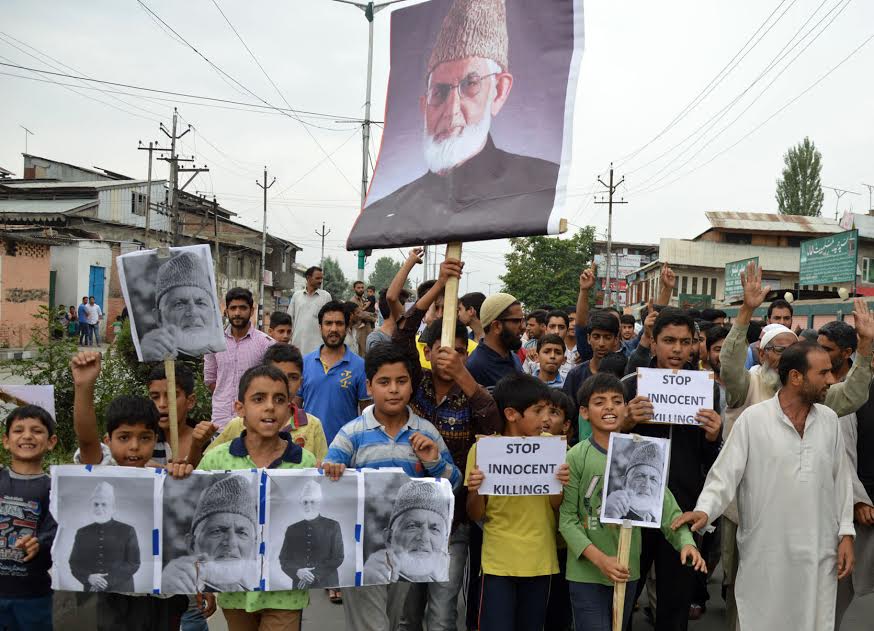
Born in Zoori Munz village of Bandipora on September 29, 1929, Geelani—a graduate in Persian from the Lahore’s Oriental College—became a local cleric before Maulana Syed Masoodi baptised him into politics in 1949. Four years later, Geelani met Jamaat cofounder Qari Saifuddin and became Jamaati whose primary goal became reviving Islam.
Apart from preaching and teaching, Geelani became a frequent prisoner for his political views. He went on to spend over a decade in jails. By 1970s, Jamaat took a collective decision to get the party recognised. Two years later, Geelani became an MLA for Sopore, the berth he retained in ’77, ’87. But for his “anti-India” activities, his passport was seized in 1981. Geelani was debarred from leaving India except for Hajj pilgrimage in 2006. In the same year, he was diagnosed with renal cancer and advised treatment from abroad. Manmohan Singh government returned his passport, but US barred him from travelling to America for surgery in 2007, citing his criticism of Iraq War. He went to Mumbai for surgery. Geelani applied for passport in May 2015 to visit his ailing daughter in Saudi Arabia. Delhi withheld it citing his inability to fill nationality column. Later Geelani said travelling in Indian passport is “compulsion” for every Kashmiri.
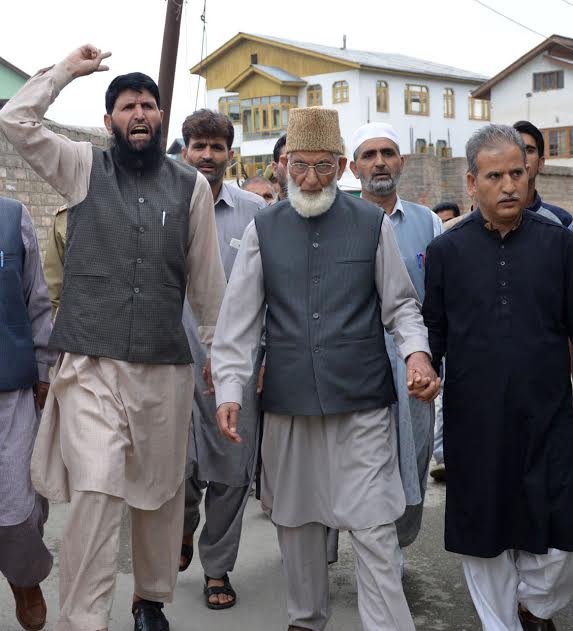
To overcome the economic crisis, a directive had already come from Hyderpora this summer regarding the establishment of Baitul Maal. Geelani had already indicated that the current spell of protest would be a drawn struggle. And for that, he had called upon the well-off people to take care of the needy. He had a strong word for the “violators”: Delhi may reward you for becoming Mir Jafars and Mir Sadiqs.
For Geelani, many say, summer 2016 was the biggest showdown. Even he knew it that he might never get another chance like this to resurrect his politics of resilience. But he refuses to put a timeline on how long the Kashmir struggle would continue. “I may not be around to see Kashmir free,” he once said, “but I can tell you the will of the people of Jammu and Kashmir will become reality one day because it is just aspiration.” It is precisely for this spirit, his supporters rally behind him: “Geelani Wali, Azadi!”
He bats for right of self-determination for Kashmir, which he believes, isn’t any Indo-Pak border dispute that can be solved by bilateral understandings. “It is the issue concerning future of 15 million people,” he says. “Without involvement of Kashmiri people, such a process has proved meaningless in the past.”
Geelani increasingly reiterates that Kashmir struggle is not based on any enmity against India. “I have repeatedly criticised groups which spread hatred against India,” he says. “We want India and its people to prosper and to do justice to the oppressed people of J&K.”
He isn’t anti-talks either—but he is against being used to showcase things that are untrue. During 2010, Geelani had a meeting with the visiting parliamentary delegates unlike 2016. On September 4, 2016, senior opposition MPs, including Sitaram Yechury, D Raja and Sharad Yadav stood right at the gates of Geelani’s Hyderpora residence before being told, “Sorry, Geelani sahib cannot meet you.”
“Delhi has completely eroded the institution of dialogue,” Geelani later said. “They’re asking us to abjure violence before coming to the table. But it’s the Indian state that is holding guns and killing our people.” Since 1947, he said, around 150 rounds of talks have taken place with Kashmir on top of the agenda.
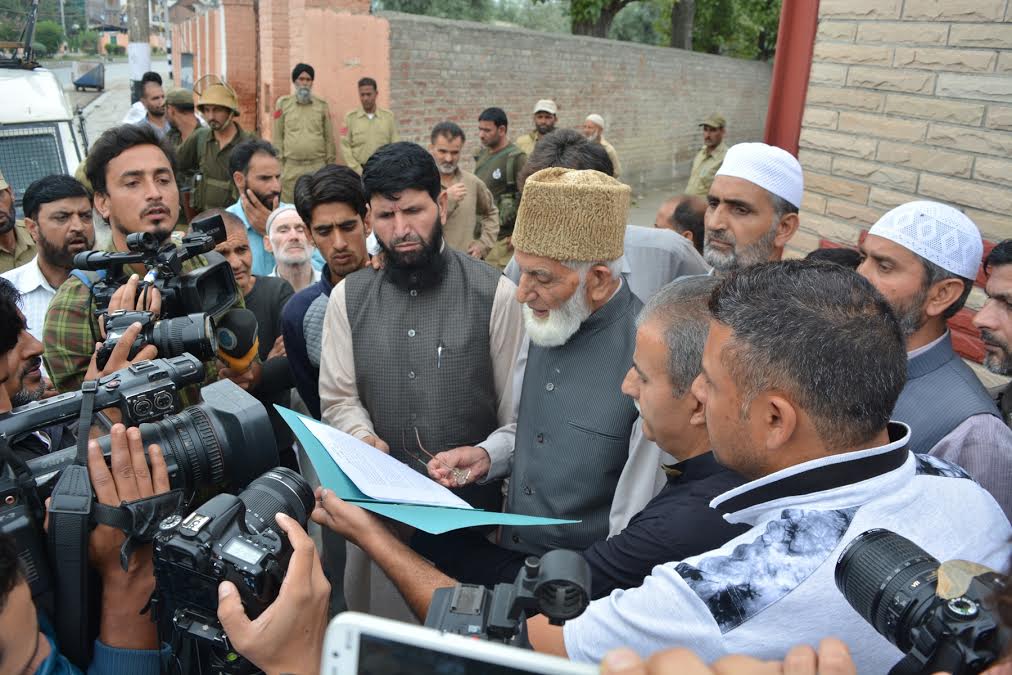
By August 27, the ruling PDP appealed to Geelani to give a chance to his “daughter-like” Chief Minister Mehbooba Mufti to address the grievances of people. “Those who are disturbing the peace,” Geelani replied, “are seeking help for restoration of peace.”
The appeal that came from ex-NC-now- PDP spokesperson Mehboob Beg was apparently based on Geelani’s bygone feat. When Omar Abdullah reportedly sent one of his advisors to meet Geelani in jail to calm the raged valley in August 2010, a peace appeal was shortly made. “I understand the passion for freedom you have,” Geelani ‘addressed the nation’ on TV. “I am as passionate as you are, but we will fight peacefully.” Even Delhi was stunned over his peace call given his support for militancy. After his address, the valley went silent. But the man never stopped terming Delhi’s Kashmir attitude “unrealistic”.
“India says that the matter must be resolved through peaceful and democratic means,” Geelani says, “and I have been participating in elections since 1962. I was a member of the assembly for 15 years. In 1987, we fought elections, the reason being to solve the issue by peaceful means. But India has never accepted this.”
With valley up in arms again, Geelani’s word is final at the moment. Despite being an advocate of Kashmir’s merger with Pakistan, Geelani continues to be regarded as the icon of the Kashmiri resistance movement. “I am also open to the idea of independent Kashmir,” he says, “because as a leader, I can’t reject the voice of the people.”
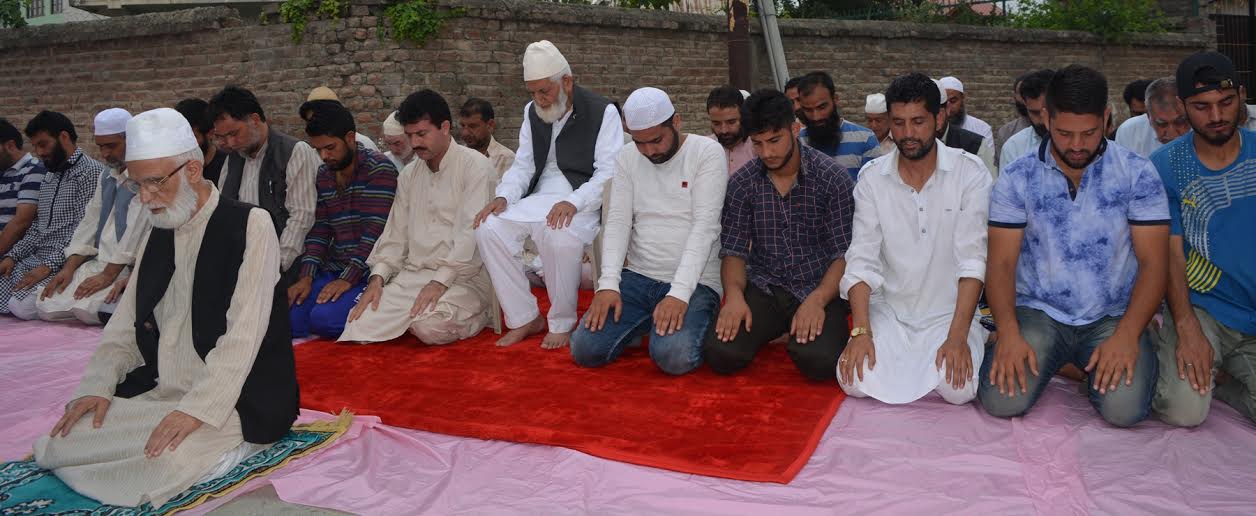
But the man also draws raging flak. Abdullahs accuse him of “militancy, bloodshed, destruction” in Kashmir. Delhi castigates him for “inciting violence”. And his detractors indict him of “pretence” of being the “uncompromising leader” of Kashmiri freedom struggle. “Geelani,” Sajjad Lone, a separatist-turned-unionist, once said, “just wants to die a martyr’s death.”
He is equally being criticised for his ‘hartal’ politics. While some choose to speak out publicly against him, many resent him for choking off economic life. “Hartal is the only weapon available to us,” Geelani says in defence of his strike strategy. “What can oppressed people do when government doesn’t even allow them to come onto the street to protest?” If on Hurriyat’s call, a shutdown is observed in valley—Geelani asks: is this not a criteria that the people of Jammu and Kashmir are with the Hurriyat?
“Are elections [he terms fauji drama] the only criteria to establish representation,” Geelani questions, “the very same election about which ex-union minister Ram Jethmalani once said, ‘We have to kill democracy [in Kashmir] to save democracy [in India].’ ”
But then his critics say the populist leader’s “self-centric” attitude is a problem. They repeatedly cite 2008 summer, when Geelani told a joint Hurriyat rally at Srinagar’s Tourist Reception Centre: “Do you accept me as your leader?” It was read as a clear snub to other leaders. Despite apologising, the remark became a Schadenfreude for his disparagers.
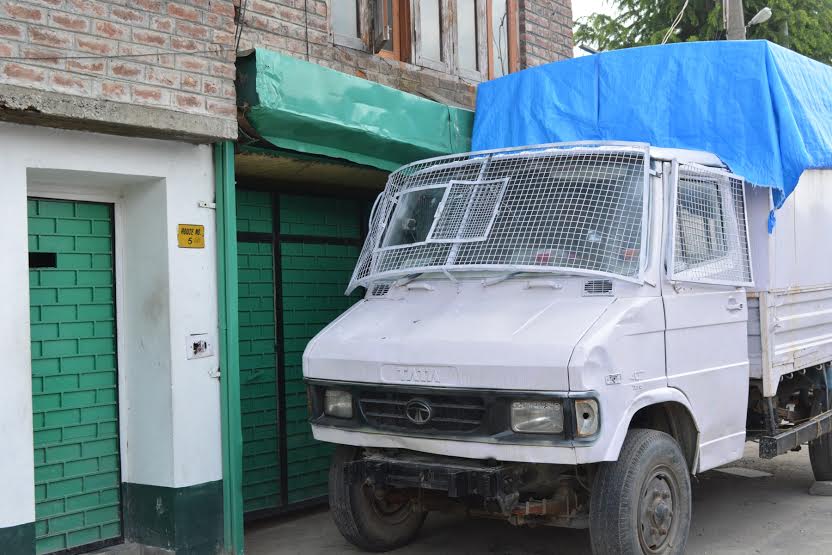
This summer, Geelani again relied on his vintage “chalo” calls to engage Delhi in Kashmir. On August 27, 2016, Geelani was detained on his way towards Badamibagh for handing over a letter to General officer Commanding asking him to “vacate”. His frequent detentions have led to repeated responses that Delhi was afraid of this 87-year-old man.
But there was a time in recent past when Delhi would send out the signals that Geelani didn’t matter in “more hardline, more radical, ISIS influenced” valley anymore. But the patriarch shortly proved himself a frontman by dismissing the actions of ISIS and Tehreek-e-Taliban Pakistan “un-Islamic”.
Then, he sent his emissaries to beckon the boys who would waive those ISIS flags after Friday congregational prayers in Old City’s restive Nowhatta. The boys, a Hurriyat activist said, met Geelani at his Hyderpora residence where the leader counselled them. It worked. ISIS flags being waived in Mirwaiz Umar’s bastion suddenly disappeared. His supporters call it Qaid’s charisma.
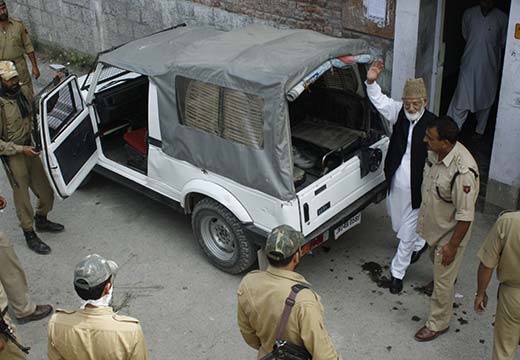
Interestingly to understand the man and his defiance, some Hindus lately came up with his horoscope. Geelani, according to his Kundli, is a person of considerable action. “Freedom is a quality Geelani prizes very highly,” his horoscope said. “He might invent some very ingenious contrivance or evolve a new method. Whatever it is, the world will be taken a step forward on Geelani’s account.”
Geelani’s greatest weakness lies in his way to treat others, his Kundli said: “Geelani resent the interference of others, perhaps more than he should.” But expecting too much too soon, Geelani is under tremendous inner tension and is too stubborn to compromise, the horoscope said. “He must learn to relax.”
But the aficionado of Allama’s writings, Muslim history and Islamic poetry is known for his fiery nature. When everyone would keep the ex-Pak army chief Pervez Musharraf in good humour over his 4-point formula, Geelani lashed out at the general: “Leave us alone — if you can’t support the Kashmiris the way Pakistan has been doing since 1947.” Geelani has taken a position where from he couldn’t come down, Mirwaiz Umar once said. “Let Delhi prove him wrong. When Delhi doesn’t move forward then he is proven right and he becomes stronger day by day.” That precisely coined the slogan: “Na Jhukne Wala, Na Bikne Wala!”

By September 9, 2016, Geelani shot what was dubbed as a “revolutionary statement” in which he said: “Never before have we been so close to freedom.” If after 70 years of military control, Geelani said, a soldier has to kill an unarmed woman and a schoolboy with a stone in his hand to forcibly keep Kashmir under Indian control, “what bigger proof do we need of who has been defeated and who is victorious?”
Previously for being “Azadi’s political face”, Geelani featured on MENSXP.com in 2010 as one of the twenty most powerful politicians who influenced life in India. He outscored then PM Manmohan Singh, achieving 9.30/10 points compared to Singh’s 3.9. “Geelani’s ‘X’ factor has been his ability to lead despite surviving a renal cancer and his adamancy to court arrest and controversy for the Azadi cause,” the website said.
But the man about whom ex-deputy CM Mangat Ram Sharma in 2004 said that “the Kashmir issue would live until Geelani is alive” lately received a letter from the state education minister. “I believe that we are caught in a big situation and its complexities are nowhere near a solution,” Naeem Akhtar wrote to him in an open letter. “I wish every child of Kashmir outperforms my children who are very well placed in life. Education saved them and many others from the fate of Insha and Junaid.” Although Geelani didn’t respond, but the minister couldn’t tell why Insha and Junaid were pelleted despite not being part of any protest.
Presently, state’s regular “peace” callings to Hyderpora have only made Geelani an unparallel leader of valley. Even Pakistan premier Nawaz Sharief described him as “a beacon of freedom for the people of Jammu and Kashmir”.
But with his two colleagues behind bars and Kashmir completing more than 15 weeks of unflinching observance to his protest programs, “what next” would be now worrying Hyderpora more—despite Bab calling the 100-long days a “historic victory”.
















He has brought misery to Kashmiris. Today Indians see this not as a human rights issue but a muslim issue. World see this as muslim issue which they have seen in Burma recently, in Chechnya, in China, In Kurdz, In Palestine, in Nigeria, Phillipines and many more. Not even one muslim out 200 millions living in india has said that Azadi be given to Kashmiri or Kashmir be merged with Pakistan. One thing is sure, if Kashmir as Geelani wants to go to Pakistan, then it is 1947 again but without Gandhi. I doubt that any muslim would live in India or would want to live in if Kashmir goes to Pakistan. Endless lines of muslims refugees to Pakistan as happened in 1947.